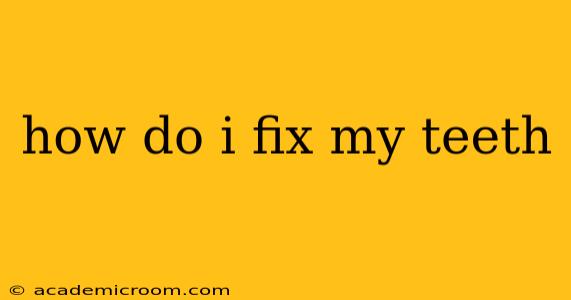Many people experience concerns about their teeth, whether it's crookedness, discoloration, gaps, or damage. Fortunately, numerous options exist to improve your smile and overall oral health. This guide explores various methods to fix your teeth, addressing common issues and helping you decide on the best approach for your specific needs.
What are My Options for Fixing My Teeth?
The best way to fix your teeth depends entirely on the problem. Let's explore the various treatment options:
1. Addressing Cosmetic Concerns:
- Teeth Whitening: For stained or discolored teeth, professional whitening treatments offer dramatic results. In-office whitening provides faster, more intense results than at-home kits, but both are effective for brightening your smile.
- Veneers: Thin shells of porcelain are bonded to the front surface of teeth to improve their appearance. Veneers can correct discoloration, chips, gaps, and minor misalignments.
- Dental Bonding: A more affordable option than veneers, dental bonding involves applying a tooth-colored resin to repair chips, cracks, gaps, or discoloration. It's less durable than veneers but provides a quick and effective cosmetic fix.
- Invisalign or Braces: For misaligned teeth, Invisalign clear aligners or traditional braces gradually straighten teeth over time. Invisalign offers a more discreet approach than braces.
2. Restorative Treatments for Damaged Teeth:
- Fillings: Used to repair cavities or small chips, fillings can be made from composite resin (tooth-colored), amalgam (silver), or gold. Composite fillings are aesthetically pleasing, while amalgam is durable and cost-effective.
- Crowns: A crown covers a damaged or weakened tooth to restore its shape, strength, and appearance. Crowns can be made from porcelain, metal, or a combination of both.
- Dental Implants: For missing teeth, dental implants provide a permanent solution. A titanium post is surgically implanted into the jawbone, acting as a root for an artificial tooth.
- Bridges: Bridges replace missing teeth by anchoring artificial teeth to adjacent healthy teeth.
3. Addressing Gum Health Issues:
- Scaling and Root Planing: This procedure removes plaque and tartar buildup from the teeth and below the gum line, treating gingivitis and periodontitis.
- Gum Grafting: Used to treat gum recession, gum grafting involves taking tissue from another area of the mouth and attaching it to the receding gum line.
How Much Does Fixing My Teeth Cost?
The cost of fixing your teeth varies greatly depending on the type of treatment, the complexity of the procedure, and your location. Factors like insurance coverage also play a significant role. It's best to consult with a dentist for a personalized cost estimate.
What are the Different Types of Dentists I Can See?
Several dental specialists can address specific dental needs:
- General Dentist: Provides routine care, including cleanings, exams, and fillings.
- Orthodontist: Specializes in straightening teeth using braces or Invisalign.
- Cosmetic Dentist: Focuses on improving the appearance of teeth.
- Periodontist: Treats gum disease.
- Endodontist: Specializes in root canals.
- Prosthodontist: Specializes in creating and fitting dentures and implants.
How Can I Prevent Future Dental Problems?
Prevention is key to maintaining good oral health. Practice excellent oral hygiene by brushing twice daily with fluoride toothpaste, flossing daily, and using mouthwash. Regular dental checkups and cleanings are essential for early detection and treatment of potential problems. Maintain a healthy diet and limit sugary drinks and snacks.
What Happens During a Dental Checkup?
A typical dental checkup includes a visual examination of your teeth and gums, cleaning to remove plaque and tartar, and X-rays to check for cavities or other issues. Your dentist will also assess your overall oral health and provide recommendations for maintaining a healthy smile.
This guide offers a broad overview of how to fix your teeth. Remember to consult with a qualified dentist to determine the best course of action for your individual circumstances. They can provide a personalized diagnosis and treatment plan based on your specific needs and oral health.
